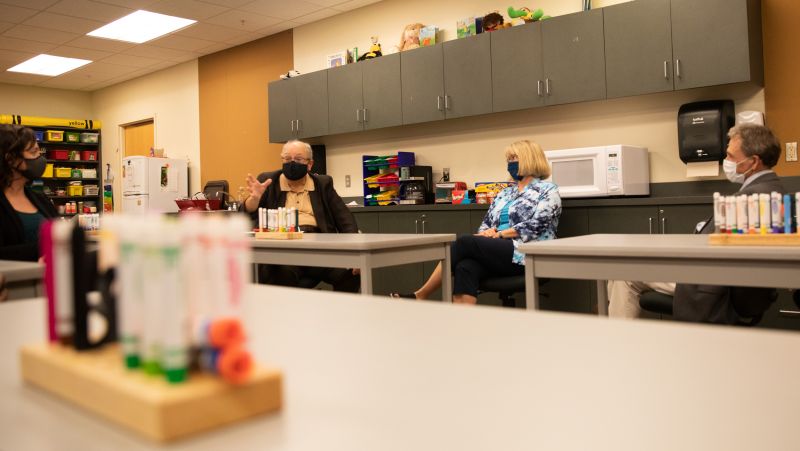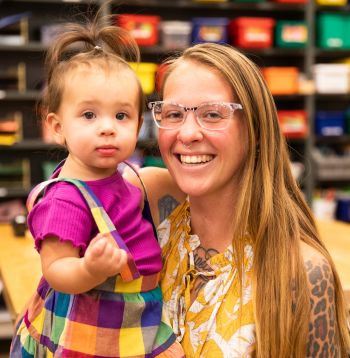
The childcare industry in Central Minnesota is in a supply crisis, but a program between SCTCC, the United Way of Central MN, and the Initiative Foundation is hoping to close the gaps between the industry shortage and the demand.
The United Way and Initiative Foundation provided last-dollar funding in 2021 for anyone interested in earning an Early Childhood Education Certificate at SCTCC, which provides the opportunity for graduates to start or progress in their careers. The certificate is 6 classes and can be finished in fewer than six months. Classes focus on human development, behavior management, inclusive learning environments, curriculum planning, and learning strategies; students also learn what it takes to be a licensed provider, how to develop and administer a quality program, and network with others in childcare.
The certificate at SCTCC started summer 2021, and so far the response has been very positive.

Casey Benner is a student currently in the program and learned about the certificate through her employer. She already has a bachelor’s degree in an unrelated field but wanted to get the certificate to enhance her knowledge and to set an example for her coworkers at Merry Moose Childcare and Preschool, where she is currently the director at their four locations.
“This opportunity – it’s a short amount of struggle in this power course, but everyone gets it done, and along the way, everyone’s supporting each other,” said Benner.
The program director, Connie Logeman, was instrumental in getting the certificate up and running. The short-term degree is what is needed in the community to help relieve the shortage.
“The shortage is crisis,” she said. There are people holding off moving to the St. Cloud region because they can’t find childcare for their children, and every week she receives emails from childcare providers asking for her students.
One of the hurdles that she sees in the industry is the low pay that providers receive. Logeman noted that this is a legislative issue: “As a country, we need to make a decision that these are important roles in our community and need to be paid more.”
So when the opportunity rose for tuition to be paid for those wishing to pursue a career in childcare, it only made sense to take part. Removing the financial barriers and extra weight from student loans and tuition costs really helps in a low-paying industry that many people feel a passion to be a part of.
The United Way of Central Minnesota started a childcare response fund with donations from the community. Alexis Lutgen is the Director of Financial Stability at the United Way, and she explained that the United Way is community solutions made by the community. The staff are collaborators that find solutions, “but it’s really the community helping the community.”
They worked with the Initiative Foundation to bring the funding to SCTCC. For the past three years, the Initiative Foundation has been planning with communities in the region and found that Central MN is short between 13,000-17,000 childcare slots, which is as much as the remaining greater Minnesota area. Amongst low pay, retirements, and workforce shortages, the barriers in childcare access just keep increasing; people aren’t going into the sector.
SCTCC Foundation President Dave Borgert recognizes how the lack of qualified childcare adversely impacts business growth in the region.
“We as a community are going to need to be responsible for developing our workforce. This particular program is a great example of how coming together, being a part of a larger initiative, and partnering with others to address that initiative can, in a very meaningful way, change the future for our community: for more prosperity, more security, and a more stable community,” he said.
SCTCC plays an important role in providing knowledgeable and credentialed workers to many area industries, whether they are seeing current shortages or will in the near future. “[We need ] to make sure our business leaders know SCTCC’s story and provide them with opportunities to help impact the development of their workforce,” added Borgert.
Don Hickman, the Vice President for Community and Workforce Development at the Initiative Foundation, has worked on the partnership at both SCTCC and Pine Technical College to encourage more people to enter the childcare industry.
“The childcare field is noble, noble work. It’s absolutely essential,” said Hickman. He explained that covering the tuition expense is just the first step. The Initiative Foundation is looking at other money-saving options for those in the industry, including bulk-purchase of health insurance and finding donors willing to give space or lease it at a nominal fee.
Getting those with the passion for childcare credentialed and ready for the workforce is the key to more childcare availability in the area, and SCTCC Vice President of Academic Affairs, Emmanuel Awuah, is excited about the opportunities these partnerships bring, to the college, to the students, and to the community.
“Giving to SCTCC enables us to respond to community needs,” he said. “I see this particular project as a win win win win. We as a community college ensure that we work with community organizations, identify the challenges, and find solutions. This one is important because it speaks to the whole mission we have, which is to respond to community needs.”
Merry Moose Childcare and Preschool, where Benner is director, is already responding to community needs as they are able. With four locations already in Rockville and Richmond, they are opening additional location in Richmond. Benner is set to finish her certificate in October, and she said she’s already seen results of what she and her fellow childcare providers are learning in the classroom. It’s been so fulfilling and an amazing feeling to see that, she noted.
“This created an opportunity for a lot people who didn’t think they’d ever have college education under their belt or be able to go back to school,” explained Benner. “It was a fantastic opportunity, and it really helped people move forward in their industry and business.”
Benner also mentioned that a couple of the people she works with are planning on continuing beyond the certificate, both at SCTCC and then at St. Cloud State University. That is a huge benefit of the certificate; it’s a stackable degree, so classes will count toward further education and also further graduates’ careers. Community and technical colleges are the ideal place to start the sort of education that benefits the community as a whole.
“Community Colleges are such an extraordinary asset,” Hickman pointed out. “They are geographically convenient throughout the state, they’re extraordinarily affordable, and they’re friendly—they’re welcoming to first-generation college students or the returning adult.”
The partnership between SCTCC and the United Way and the Initiative Foundation lays groundwork for the type of programs that make the community a better place, and like Lutgen said, it’s more about the community helping out the community.
“It’s really looking at the future and the success of our community. Knowing that you’re helping the future of the community, which essentially helps us all, is a great reason to be involved and to give,” Lutgen said.
It comes around full circle: in their classes, Logeman said that the Education students learn about how important it is to serve the community. With the support from the community, they see the reciprocal relationship that the students and community provide each other.
Benner confirmed this sentiment several times: “I don’t think it would’ve been possible otherwise. It’s hard work, you have to be dedicated, you have to give time to it. But it’s really worth it. I’m very lucky to participate in it.”